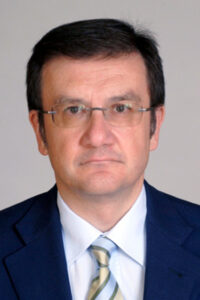Behçet syndrome is confusing. Not only do its multisystemic manifestations mimic a long list of other diseases, but Behçet itself is uncommon outside of specific Middle Eastern and Asian populations.

“Because Behçet is rare, it doesn’t come to clinicians’ minds early enough,” said Yusuf Yazici, MD, Clinical Associate Professor at New York University Grossman School of Medicine and Director of the Behçet’s Syndrome Center at the NYU Hospital for Joint Diseases.
“Once they realize it’s Behçet, it becomes a problem to decide how and how aggressively to treat because there are so many different phenotypes,” he continued. “The main problem is recognizing the disease first, then recognizing the severity of disease so you can match treatment options to agents that are actually available.”
Dr. Yazici will moderate the Curbside Consult session Controversies in Behçet’s Syndrome Management from 10:15 – 11 a.m. ET Monday, Nov. 8. The session also will be available on demand for registered meeting participants through March 11, 2022.
There are no fast or easy answers with a syndrome that manifests with cutaneous, ocular, central nervous system (CNS), gastrointestinal (GI), vascular, and joint problems. Furthermore, there are few high-quality, prospective, controlled trials to guide treatment.

The European Alliance of Associations for Rheumatology (EULAR) updated its Behçet management recommendations in 2018. In the absence of solid clinical trial evidence, the recommendations rely largely on expert opinion and consensus for the less common manifestations, such as CNS, vascular, and GI involvement. Gülen Hatemi, MD, Professor of Rheumatology at Istanbul University Cerrahpasa Medical School in Istanbul, Turkey, was lead author of the update and is one of the speakers for Monday’s session.
“There are many contextual factors to take into account, such as variations in prevalence between different countries and populations, cultural differences between patients, and the availability of agents to treat Behçet,” Dr. Hatemi said. “Our aim is to present the evidence so clinicians can make individual decisions with their patients depending on the advantages and disadvantages of different approaches in their own practice.”

While colchicine is traditionally the first-line agent for mucocutaneous involvement, it is not always the most appropriate choice, said Haner Direskeneli, MD, Professor and Chief of Rheumatology at Marmara University School of Medicine in Istanbul.
“Colchicine is cheap and available, but less effective than apremilast,” Dr. Direskeneli said. “Apremilast is more effective and may have a beneficial effect on the long-term consequences of Behçet, but it is more expensive and not always available.”
There are also multiple options for ocular involvement. When conventional immunosuppressives fail, TNF inhibitors can have a significant impact on uveitis, Dr. Direskeneli said. However, lack of response or side effects may require other biologic options, such as anti-IL-6 or anti-IL-1 agents, he said.
There are similar questions around the most appropriate treatment of thrombosis in Behçet. Anticoagulation is almost a reflex approach to thrombosis for many clinicians, Dr. Yazici noted, but immunosuppression is key in Behçet, he added.
“In the U.S., a thrombotic event is often the first sign of Behçet, and the usual treatment approach to a thrombotic event is initiated,” Dr. Yazici said. “In Turkey and other places where Behçet is more common and better recognized, clinicians usually start with immunosuppression. But there is always back and forth as to whether anticoagulation should be used in addition to immunosuppression.”
REGISTER TODAY FOR ACR CONVERGENCE
If you haven’t registered for ACR Convergence 2021, register today to access all of the valuable content during the meeting, November 3–10. Registration also includes on-demand access to the virtual platform (session recordings, Poster Hall, Community Hubs, and ShowRheum) until March 11, 2022.
